| Portrait | Name | Office | Took office | Left office | | Party | Federal Home State |
|---|
|
|---|
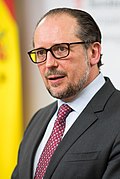 | Alexander Schallenberg | Chancellor of Austria [a] | 11 October 2021 (2021-10-11) | 6 December 2021 (2021-12-06) | | ÖVP | (Born abroad) |
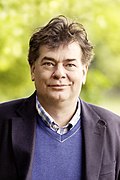 | Werner Kogler | Vice-Chancellor of Austria
Minister for Arts, Culture, the Civil Service and Sport | 7 January 2020 (2020-01-07) | | | Greens |  Styria Styria |
|
|---|
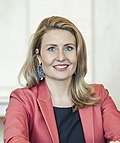 | Susanne Raab | Chancellery minister for Women and Integration | 7 January 2020 (2020-01-07) | | | ÖVP |  Upper Austria Upper Austria |
| Minister for Women, Family, Youth and Integration | 1 February 2021 (2021-02-01) | |
 | Karoline Edtstadler | Chancellery minister for the EU and Constitution | 7 January 2020 (2020-01-07) | | | ÖVP |  Salzburg Salzburg |
|
|---|
 | Gernot Blümel | Minister of Finance | 7 January 2020 (2020-01-07) | 6 December 2021 (2021-12-06) | | ÖVP |  Vienna Vienna |
 | Heinz Faßmann | Minister of Education, Science, and Research | 7 January 2020 (2020-01-07) | 6 December 2021 (2021-12-06) | | Independent
(ÖVP nominated) | (Born abroad) |
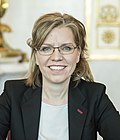 | Leonore Gewessler | Minister of Climate Action, Environment, Energy, Mobility, Innovation and Technology [b] | 7 January 2020 (2020-01-07) | | | Greens |  Styria Styria |
 | Martin Kocher | Minister of Labour | 11 January 2021 (2021-01-11) | | | ÖVP |  Salzburg Salzburg |
 | Elisabeth Köstinger | Minister of Agriculture, Regions, and Tourism | 7 January 2020 (2020-01-07) | | | ÖVP |  Carinthia Carinthia |
 | Michael Linhart | Minister for European and International Affairs | 11 October 2021 (2021-10-11) | 6 December 2021 (2021-12-06) | | ÖVP | (Born abroad) |
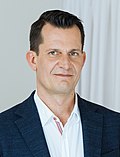 | Wolfgang Mückstein | Minister of Social Affairs, Health, Care, and Consumer Protection | 19 April 2021 (2021-04-19) | | | Greens |  Vienna Vienna |
 | Karl Nehammer | Minister of the Interior | 7 January 2020 (2020-01-07) | 6 December 2021 (2021-12-06) | | ÖVP |  Vienna Vienna |
 | Margarete Schramböck | Minister of Digital and Economic Affairs | 7 January 2020 (2020-01-07) | | | ÖVP |  Tyrol Tyrol |
 | Klaudia Tanner | Minister of Defence | 7 January 2020 (2020-01-07) | | | ÖVP |  Lower Austria Lower Austria |
 | Alma Zadić | Minister of Justice | 7 January 2020 (2020-01-07) | | | Greens | (Born abroad) |
|
|---|
 | Magnus Brunner | State secretary in the Ministry for Climate Action, Environment, Energy, Mobility, Innovation and Technology [b] | 7 January 2020 (2020-01-07) | 6 December 2021 (2021-12-06) | | ÖVP |  Vorarlberg Vorarlberg |
 | Andrea Mayer | State secretary in the Ministry for Arts, Culture, the Civil Service and Sport | 20 May 2020 (2020-05-20) | | | Independent
(Greens nominated) |  Lower Austria Lower Austria |
|
|---|

















